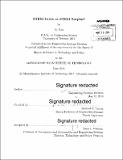STEM crisis or STEM surplus?
Author(s)
Xue, Yi,Ph. D.Massachusetts Institute of Technology.
DownloadFull printable version (5.729Mb)
Alternative title
Science, technology, engineering, and mathematics workforce crisis or science, technology, engineering, and mathematics workforce surplus
Other Contributors
Massachusetts Institute of Technology. Technology and Policy Program.
Advisor
Richard C. Larson.
Terms of use
Metadata
Show full item recordAbstract
The science, technology, engineering, and mathematics (STEM) workforce is a crucial driver of the U.S. economy. Over the last decade, there has been significant concern regarding the adequacy of the supply of STEM workers to meet the demands of the market. At the same time, many experts have presented evidence that there is a surplus of STEM workers. This thesis tries to reconcile the "STEM Crisis" vs. "STEM Surplus" debate by examining the heterogeneity of the supply and demand for the STEM workforce. The taxicab queueing model is presented as a frameworking metaphor to better understand the variation across different job segments, degree levels, and regions as well as illuminate the probabilistic nature of supply and demand markets. An analysis of the STEM labor market is conducted using an in-depth literature review using available data sources in conjunction with informal sources such as newspaper articles and interviews with company recruiters. Findings indicate that there is significant heterogeneity in the STEM labor market. The academic sector is generally oversupplied. The government sector has shortages in specific areas such as doctorates in nuclear engineering, materials science, and electrical engineering, as well as cybersecurity and intelligence professionals. The private sector also has specific shortages for positions such as petroleum engineers, data scientists, and software developers. At the same time, there are surpluses for graduates in areas like chemistry arid physics. The demand and supply also varies according to location and U.S. citizenship. Yes, there is a "STEM Crisis" and no, there is not a "STEM Crisis". It depends on where you look.
Description
Thesis: S.M. in Technology and Policy, Massachusetts Institute of Technology, Engineering Systems Division, Technology and Policy Program, 2014. Cataloged from PDF version of thesis. Includes bibliographical references (pages 73-77).
Date issued
2014Department
Massachusetts Institute of Technology. Engineering Systems Division; Technology and Policy ProgramPublisher
Massachusetts Institute of Technology
Keywords
Engineering Systems Division., Technology and Policy Program.